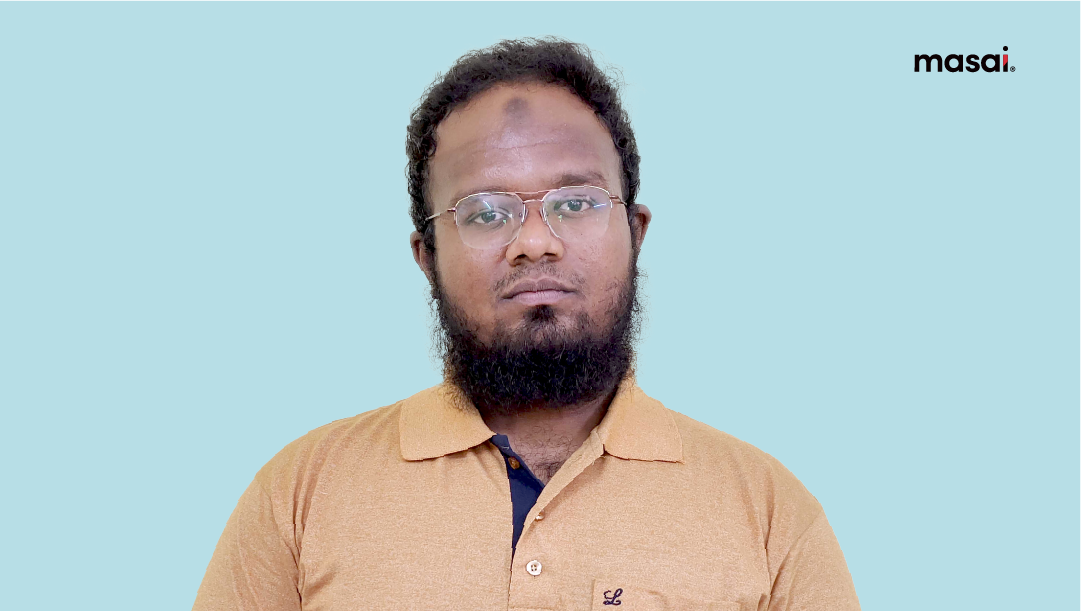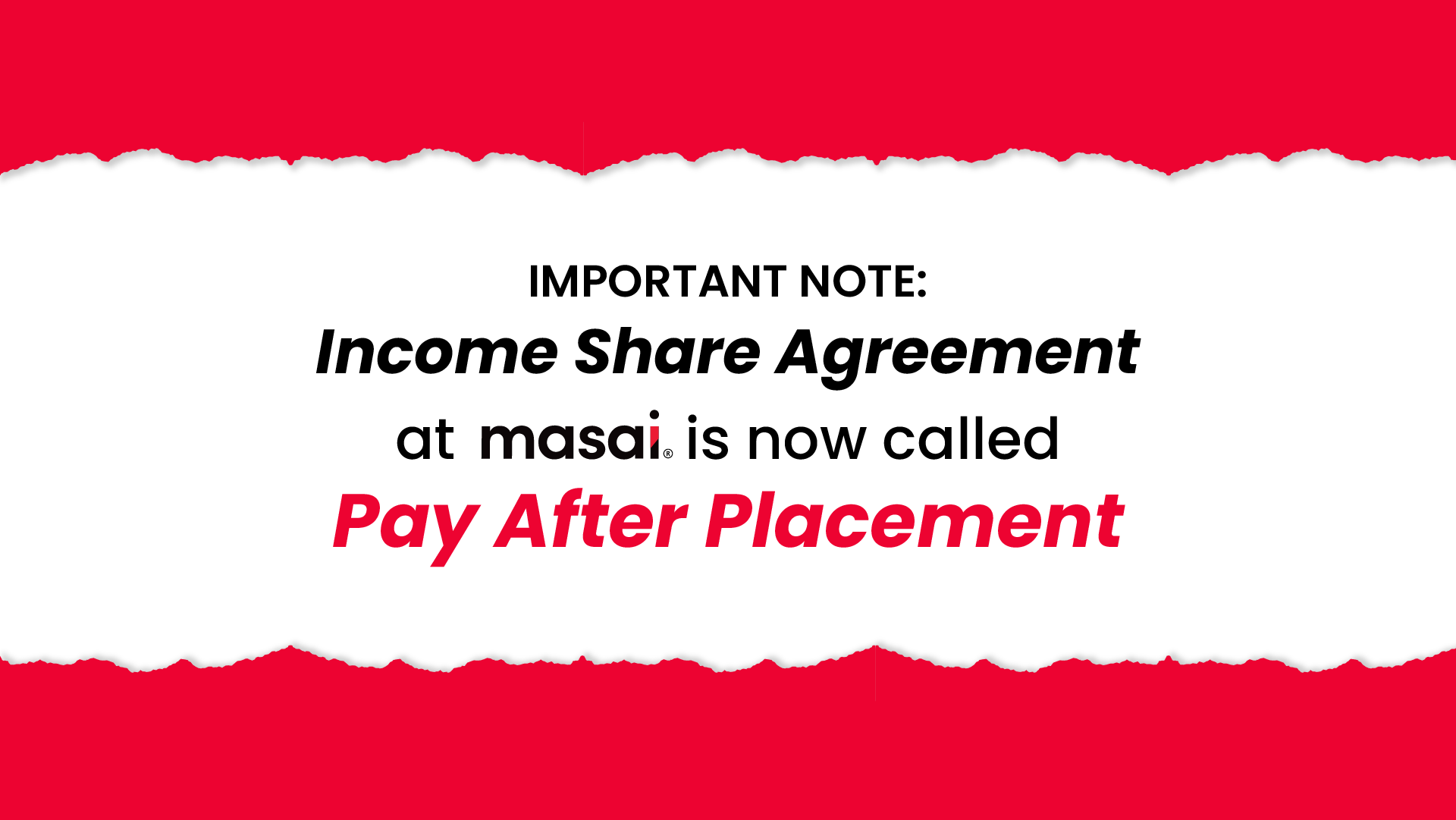Masai graduate Hassan clears his ISA in record time


Hassan’s journey with Masai started in the very early days of the first batch called – “The Vikings”. In those days when the Founder trio – Prateek, Nrupul, and Yogesh were still experimenting with their unique curriculum that allows almost anyone with the hunger to learn, and work hard to become a Software Developer, and that too in just 30 weeks!
Hassan who hails from Salem is a Mechanical Engineer who’s currently working with Sharechat as a Software Engineer, one of India’s largest homegrown social networks. In our conversation with Hassan, we talk about his journey with Masai and becoming the first few people to have successfully completed their ISA(Income share agreement), in a record time of just 12 months. In this blog, we share some of the highlights from our conversation with Mohammed Hassan.
What did you feel when you heard about ISA for the first time? How did you convince your family?
Initially, I had some concerns, and I thought that this is too good to be true. How can one promise that we don’t have to pay until we are placed? The promises may not be fulfilled. But then what other option did I have? I was doing a job that I didn’t like, and that didn’t pay me enough. When I discovered Masai I remember actively reaching out to the Masai team with repetitive questions, and every time the team was sincere and patient with their answers which allowed me to take the leap of faith, and join Masai’s first-ever batch – Vikings.
My father said – “If you think it is the right thing to do, then go ahead, and pursue the idea”. Initially, it was a little difficult to convince them, but then with time I think they saw my efforts, and the hard work of Nrupul, Prateek, Yogesh, and Ankur, and I think that led them to believe in the Masai mission.
Experience of working at Sharechat as a Software Engineer?
Almost all my colleagues come from very prestigious colleges, and in the early days as an intern, I would silently observe my senior’s work, and that allowed me to understand and learn a lot from their behaviors, and patterns. With time I understood that they were successful because of their relentlessness, and their hard work. I would see engineers work late nights, and not leave their tasks until they have solved the problem at hand, and in ways, that’s when I understood how my experience at Masai School as a student would benefit me in my journey.
It is often said that – ‘In your professional career for the first 2 years if you work as hard as you possibly can, then you would have leaped 5-6 years ahead in your lives, and I think in my professional life I worked on weekends(out of choice), constantly seeking advice from my seniors, and doing my best to match the levels of my peers, and all of these choices made me competitive in a good way. Since I continued pursuing my desire to learn, I was soon working on some very special projects with my team.
I think the overall Masai experience has allowed me to give a strong headstart to my professional career as a Software Engineer.
What do you think about the differences between the educational model and the ISA model?
In the traditional model, as students, we’d know that even if we work hard, the chances of us succeeding is bleak, and by the time we enter our final year of college, we start looking for the next thing to study, because we are forced to believe that Bachelors degree isn’t enough. But in ISA based educational system, there is hope that the outcome of the course would be defined, and we would get placed as software engineers because the educational institution is as accountable for the student’s success as the student himself.
The ISA (Income Share Agreement), based model allows the students to trust the system, and believe that in this process of learning the educational institution is equally responsible for the student’s success and that as a mindset change is good.
ISA (Income Share Agreement) for India?
I think ISA should be encouraged, and the youth would embrace the ISA model and feel more responsible with it being implemented. Mentors are more participative in the journey of their students, and this paves way for a better learning environment.
Traditionally our colleges have teachers who usually have limited practical experiences, and are not so interested in teaching which becomes one of the key reasons the students become disinterested. But with the ISA model in place, the educational institutions are equally accountable for the student’s success, thus the educators and the entire organization would align their thoughts, and efforts towards the success of the students. The implementation of ISA on a national level will be key towards catalyzing the success of students in India.
How should one prepare for their ISA journey?
A student starts paying back for their education at Masai School through ISA where-in they pay 15% of their monthly income capped at 3 lakhs, or for a period of 36 months. Therefore after I got placed and my income was above the desired threshold of 5 lakhs, I started paying back every month.
Typically it can be cleared in 36 months, but if you are earning above the benchmark, your monthly contribution would be higher thereby helping you clear your ISA sooner, just in my case. With the help of the Masai team, I had developed decent coding skills, and that allowed me to build a foundation that ultimately helped me earn much more than the benchmark package, therefore reducing the time taken for me to pay back my ISA.
Advice to anyone studying at Masai School?
Listen to your mentors, don’t get stuck on something, and if you are facing troubles in solving a problem, then do not shy away from contacting your peers, or your coaches, and mentors. Initially, you may feel shy, and unsure if you should ask your doubts, but with time you’ll learn how it becomes easy, and how beneficial it is to communicate.
This is applicable not just during the time you’re spending at Masai, but also during your professional careers.
The Masai Experience
In our discussion with Hassan after a year of his graduation, the essence of the conversation revolved around the thought of the Masai experience that as a culture allows the students to prepare better, and experience how to become a better professionals.
Hassan’s constantly emphasized how the team at Masai pushes the students to learn more, and more by challenging them, and the best part is that the focus is not just about teaching code skills, but the overall holistic development of the student which ultimately sets the foundation for the professional career of the student.
In Hassan’s case, we see that he moved from a core mechanical engineering to a high-paced tech company, and excel as a Software Engineer.
One thing that came out multiple times in our conversation with Hassan was “Access to the community!”
After graduating, Hassan shared his journey at Masai School, and here’s the video, where you can hear him share his experiences with Masai School when he was a student. In this video, he talks about the curriculum, the role of mentors, how he overcame the difficulties in learning data structures, and how all this happened in just 30 weeks, which ultimately makes us write about his inspiring story here.

